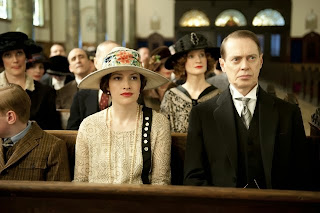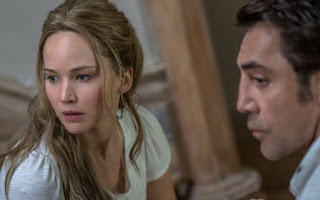TV7: Boardwalk Empire, House of Cards, Boss and The Sopranos
Four cable TV ‘soaps’ about powerful men trying to gain ever more power, usually by destroying the lives of those around them and frequently acting with the motive of revenge against those who dare to challenge them. All four men struggle, to varying degrees, with their personal demons, their moral choices and their need to love and be loved. This struggle is one of the things that makes these shows worth watching. Coincidentally, each of these four men is married to a strong woman who is not afraid to challenge, even defy, her powerful husband, leading to side-stories which are often more interesting than the stories of the four men, another reason to watch the shows. There’s no ‘formula’ here as such, but clearly the theme of power-hungry men is popular (even Breaking Bad has some similarities to what I have described above).
The four men in question are Nucky Thompson (prominent bootlegger in 1920‘s Atlantic City), Francis Underwood (Majority Whip for the Democratic Party), Tom Kane (mayor of Chicago), and Tony Soprano (New Jersey mob boss), played by Steve Buscemi, Kevin Spacey, Kelsey Grammer and James Gandolfini respectively. All four actors are superb in their roles, each providing a unique take on the joys and pains of power (much more pain than joy, in my opinion, another factor contributing to the watchability of these shows). The wives are played by Kelly Macdonald, Robin Wright, Connie Nielsen and Edie Falco, and they are also superb in their roles. Combined with the fact that these are all well-made (again, to varying degrees) cable TV shows, that’s enough factors to give all four shows ***+.
That’s right. None of these shows gets **** from me. Why? Precisely because they are about men in power using whatever means necessary to gain more power (or hold on to the power they have). I can’t relate to this theme sympathetically enough (who can, I ask?) to engage emotionally with any of these protagonists. Even if these were not all violent men, my personality style prevents me from understanding their relentless drive for power. Such a drive so clearly costs much more than it’s worth (again, not just for those who use violence). Keep in mind that, film buff though I may be, I am also not a fan of The Godfather. No matter how brilliant and profound a film or show may be, if it’s about gangsters or men chasing power, I’m just not that interested.
(Sidebar for further reflection: Why is it that I am able to relate more sympathetically to Dexter, a serial killer?)
Okay, let’s take a look at these shows one at a time (because of my memory issues, I will devote more space to the most recent shows).
Boardwalk Empire
Just finished the third season. Oh my! Come on, guys! Rosetti? Really? I won’t argue that Bobby Cannavale isn’t well-deserving of his recent Emmy Award for playing the nasty Gyp Rosetti, but Rosetti’s dominating presence in the third season is the primary reason I couldn’t enjoy this season (well, okay, I could enjoy Cannavale’s performance). Every time Rosetti is on screen, we expect (anticipate?) him to kill somebody. This is not a good thing, especially in a show that arguably promotes violence as entertainment. It doesn’t help that Boardwalk Empire is generally a very slow-moving, dialogue-heavy show (this is usually a plus for me, but not when I have so little interest in the gangster-related pieces of the plot). I don’t know if other viewers get bored with parts of the show the way I do, but I do know that for me it adds to the feeling that the inevitable graphic violence is there to be anticipated and enjoyed. Who doesn’t want to see gangsters kill each other off? If they are killed off en masse by one of the show’s more sympathetic characters, all the better. And best of all is if the nastiest of the big baddies (Rosetti, made to look depraved in every way) gets it as brutally, graphically and painfully as possible. Yup, that’s exactly what the world needs more of today: TV shows that promote dehumanization and the enjoyment of graphic violence (after all, it’s cathartic, right, Mr. King?). Sigh.
So why, you are asking, would I give Boardwalk Empire ***+ and keep watching (indeed, usually watching the new season as soon as it’s released on DVD)? Excellent question. Well, for one thing, it’s a gorgeous period drama based on the lives of real gangsters. It features great acting and intelligent writing. It has some worthwhile and fascinating side-stories like Maggie’s work for women’s rights (and yes, I have a soft spot for Kelly Macdonald, who plays Maggie, if for no other reason than that I bumped into her five years ago on my birthday, as she was walking her dog in Hampstead). And Buscemi’s (I’ve always liked his work) Nucky Thompson is, for me, the most sympathetic of the four protagonists. He’s a broken thoughtful man driven to ruthlessness against his better instincts. He just wants some respect (don’t we all?). So, perhaps I’ll call this a guilty pleasure with rationalizations.
Warning: Lots of graphic violence as well as graphic sex and nudity. Sometimes these scenes feel gratuitous, other times not.
House of Cards
Oh my! Come on, guys! Russo? Really? Sigh. Without giving too much away, let’s just say that this show’s treatment of my favourite character, Peter Russo (the most sympathetic character in the show), doesn’t make me look forward to the second season.
House of Cards, a show actually designed to be watched in one sitting (yes, all thirteen episodes), concerns Frank Underwood’s scheming for political power in Washington. While Underwood is the least violent of the four men highlighted above, he is also, for me, the least sympathetic (his ruthlessness emanates from a colder darker place). This is problematic for the show’s most fascinating feature: Underwood looks at the camera and speaks directly to the TV audience. I enjoy that, especially since his dialogue is usually witty and insightful, but the idea is that we are meant to love this nasty fellow at some level. While I appreciate that concept in principle, it doesn’t work for me in this case. And while much of the writing in the show is intelligent, there are times when it feels over-the-top.
The show’s biggest flaw for me, however, is the sense that I am watching something hollow, something so superficial and cynical that any opportunity to say something meaningful is wasted. This is sad.
On the other hand, House of Cards is gorgeously filmed and very well-directed. It also contains a major sub-plot about investigative journalists that I find particularly compelling (though I won’t say it has been handled very well so far).
House of Cards has the distinction of having much less violence and sex/nudity than the other three shows and thus avoids getting critiqued for gratuitous use of same.
Boss
Tom Kane, mayor of Chicago, finds out he is suffering from a terminal neurological disease but remains determined to hang onto power as long as possible. This show has many similarities to House of Cards, but is nowhere near as polished. Indeed, in terms of overall production values, Boss is by far the weakest of the four shows (though it has some beautiful stylistic elements). Among its many failings are the laughably melodramatic romantic entanglements, in which all of the sex/nudity feels gratuitous, and a deeply cynical sentiment in much of its uneven dialogue. And yet, ironically, I find Boss among the most compelling of the four shows, perhaps because of Grammer’s performance as a man suffering at so many different levels (but, like the other three men, needing to remain ruthless to hold on to a warped sense of self and self-worth).
The Sopranos
The godfather of cable TV (in various ways)! The Sopranos started it all, brilliantly capturing the feel of mob life in New Jersey while giving us the unique central plot hook of seeing mob boss Tony Soprano regularly undergoing psychotherapy (his therapist is played perfectly by Lorraine Bracco). Because this show concentrates on what’s going on in the head of its protagonist, it is usually (though not always) easier to be sympathetic.
In terms of overall writing and acting, The Sopranos remains by far the best of the four shows, the standard to which other cable TV shows must aspire. But even The Sopranos, thanks to its dark tales of mob life and revenge that are more life-draining than life-giving, doesn’t get **** from me. And, partly because it was breaking new ground, I do accuse The Sopranos of occasionally presenting gratuitous violence and nudity.
My mug is up for all four of these shows, but they are recommended only to those who are not scared off by violence (though hopefully don’t enjoy it).





Comments
Post a Comment